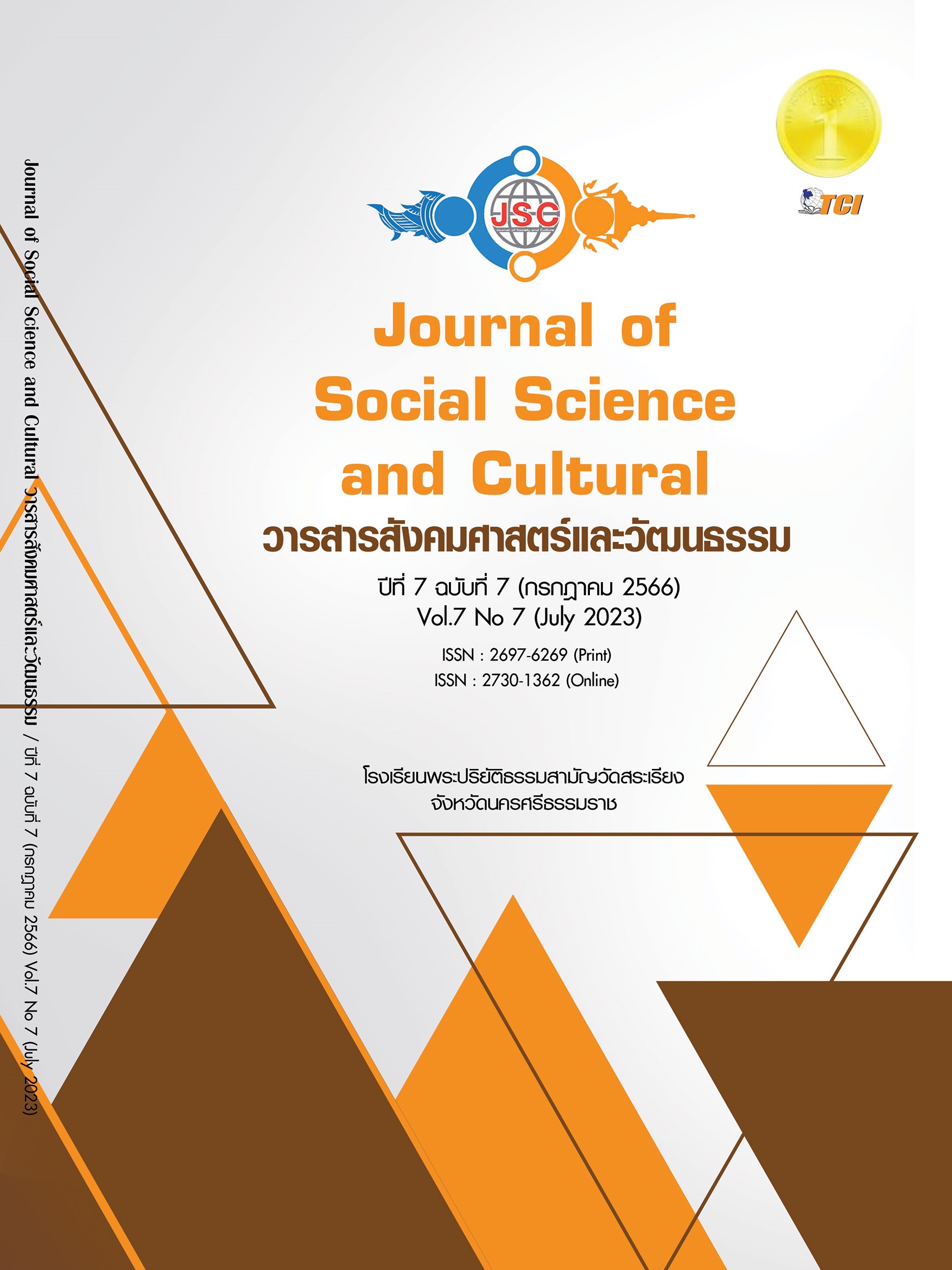SRITHAMMASOKARAJA KING AND ADMINISTRATIVE MODEL OF TWELVE ZODIAC SIGNS FOR GOOD GOVERNANCE
Main Article Content
Abstract
Research on “Srithammasokaraja King and administrative model of twelve zodiac signs for good governance” The objectives of the research were as follows: 1) to study the theoretical concepts of government in the reign of Srithammasokaraja King for good governance. 2) to study the governance model of twelve zodiac signs for good governance. 3) to integrate the governance principles in the reign of Srithammasokaraja King and administrative model of twelve zodiac signs for good governance. This is the qualitative research by studying from academic papers, books, researches with in-depth interviews from experts in history, culture and administrative sectors totally 15 persons. Data analysis by thematic analysis. The results of the research showed that: 1) The concept of government in the reign of Srithammasokaraja King for good management of the country was a management that combines concepts from various perspectives of government which focused on well being and happiness of people to get peace, safe and country benefit as significantly. 2) The form of government of the Twelve Zodiac cities for good governance was the decentralization of administrative powers related to the administration of the area, to use of resources as balance and applying the Dhamma principle for center of administration and management. 3) Knowledge body from research can be transformed into a model "NAKSAD MODEL". N = Network A = Assessment K = Knowledge S = System analyst and Design A = Attribution D = Decentralization
Article Details
References
โกเมศ ขวัญเมือง. (2565). การปกครองในระบอบประชาธิปไตยภายใต้หลักนิติธรรม. วารสารมหาจุฬานาครทรรศน์, 9(5), 557- 567.
คะนอง วังฝายแก้ว. (2565). แนวคิดการปกครองตามรูปแบบประชาธิปไตยตามทัศนะพระพุทธศาสนา. เรียกใช้เมื่อ 10 ธันวาคม 2565 จาก https://www.gotoknow.org/posts/450052
ฐิติรัตน์ มานิพารักษ์. (2564). ประสิทธิภาพการบริหารบ้านเมืองที่ดีตามหลักธรรมาภิบาลขององค์กรปกครองส่วนท้องถิ่น ในจังหวัดปทุมธานี. วารสารการบริหารการปกครองและนวัตกรรมท้องถิ่น, 5(1), 1-18.
นครินทร์ แก้วโชติรุ่ง. (2554). ธรรมาธิปไตยในฐานะเป็นเครื่องมือพัฒนาประชาธิปไตยในสังคมไทย. ใน ดุษฎีนิพนธ์พุทธศาสตรดุษฎีบัณฑิต สาขาวิชาพระพุทธศาสนา. มหาวิทยาลัยมหาจุฬาลงกรณราชวิทยาลัย.
ประภาส วรรณทอง. (2559). การบริหารจัดการตามหลักธรรมาภิบาลของเทศบาลตำบลนาคู อำเภอนาคู จังหวัดกาฬสินธ์. วารสารการเมืองการปกครอง, 6(2), 112-126.
ปรีชา นุ่นสุข. (2543). ประวัติศาสตร์พุทธศาสนาในคาบสมุทรภาคใต้ของประเทศไทย. ใน รายงานวิจัย. คณะกรรมการวิจัยการศึกษา การศาสนาและการวัฒนธรรม กระทรวงศึกษาธิการ.
พระชัฏฐวีร์อนาลโย (อนันตกลิ่น). (2565). หลักการปกครองตามแนวพุทธศาสตร์. วารสารพุทธนวัตกรรมปริทรรศน์, 1(2), 15-23.
ราชกิจจานุเบกษา. (2557). รัฐธรรมนูญแห่งราชอาณาจักรไทย (ฉบับชั่วคราว) พุทธศักราช 2557. เรียกใช้เมื่อ 12 มกราคม 2566 จาก http://www.ratchakitcha.soc.go.th/DATA/PDF/2557/A/055/1.PDF
สมภพ ระงับทุกข์. (2564). การปกครองระบอบประชาธิปไตยกับสถาบันทางการเมืองไทยในยุครัฐธรรมนูญ 2560. วารสารปรัชญาปริทรรศน์, 26(2), 205-215.
สำนักงานคณะกรรมการกฤษฎีกา. (2546). พระราชกฤษฎีกา ว่าด้วยหลักเกณฑ์และวิธีการบริหารกิจการบ้านเมืองที่ดี. เรียกใช้เมื่อ 7 มกราคม 2566 จาก https://shorturl.asia/5sq72
สุนิษา คิดใจเดียว. (2564). สื่อรณรงค์อนุรักษ์ศิลปวัฒนธรรมประวัติศาสตร์นครศรีธรรมราช. วารสารวิชาการการประยุกต์ใช้เทคโนโลยีสารสนเทศ, 7(2), 63-74.


